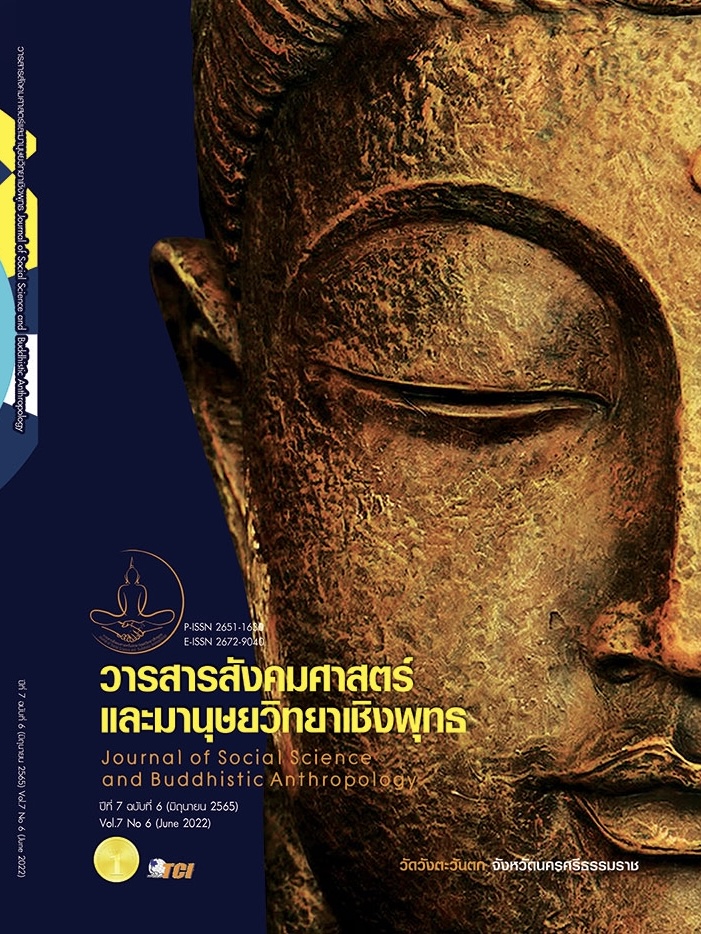A STUDY OF THE MEANING, CHARACTERISTIC AND DEVELOPMENT OF ACTIVE GLOBAL CITIZENSHIP BASED ON TRANSFORMATIVE LEARNING AMONG UNDERGRADUATE STUDENTS
Keywords:
Characteristics and Development, Active Global Citizenship, Transformative Learning, Undergraduate StudentsAbstract
The objectives of this research article were to 1) study the meaning and characteristics of active global citizenship among undergraduate students 2) study the development of active global citizenship among undergraduate students. This research is a qualitative research and collects the data through in - depth interview with 10 key informants as follows: two active global citizenship experts, four student affairs executives and professionals and four undergraduate students who are members of student clubs related to social development, volunteering and community service. Data was collected by semi - structured interview and content analysis. The research reliability was checked by triangulation that is data triangulation, method triangulation and theory triangulation. The research findings indicate that the key informants placed an importance on the characteristics of active global citizenship which should be specified in the learning outcomes of undergraduate students. They emphasized that the characteristics of active global citizenship consist of the following three dimensions: 1) Knowledge and Understanding, 2) Skills, 3) Values and Attitudes. They suggested that the approaches to develop active global citizenship should be implemented in the following ways: 1) Facilitate a conducive learning environment to promote Asian or internationalization, 2) Devise transformative learning in cognition, belief and desirable behaviors into course instruction, 3) Promote a good example or role model of active citizen and global citizen, 4) Organize experiential learning outside the classroom, 5) Integrate active global citizenship into courses and training programs, 6) Build a network of cooperation to serve both Thai and the world community.
References
กรมสุขภาพจิต. (2560). รายงานประจำปีกรมสุขภาพจิต ปี 2560. กรุงเทพมหานคร: กองยุทธศาสตร์และแผนงาน กรมสุขภาพจิต กระทรวงสาธารณสุข.
คณะกรรมการส่งเสริมการพัฒนาเด็กและเยาวชนแห่งชาติ. (2561). แผนพัฒนาเด็กและเยาวชนแห่งชาติ ฉบับที่ 2 พ.ศ. 2560 - 2564. กรุงเทพมหานคร: โรงพิมพ์ เจ.เอส. การพิมพ์.
ณธรา เหมือนปิ๋ว. (2561). การพัฒนาพลเมืองไทยให้มีความเป็นพลเมืองโลกในประเทศไทยยุค 4.0. วารสารครุศาสตร์ จุฬาลงกรณ์มหาวิทยาลัย, 46(3), 86-99.
ปรตี ประทุมสุวรรณ์. (2562). การศึกษาเพื่อการพัฒนาความเป็นพลเมืองโลก : การเรียนรู้แบบบูรณาการสู่การพัฒนาอย่างยั่งยืน. Educational Management and Innovation Journal, 2(1), 100-121.
ประสาท เนืองเฉลิม. (2558). การเรียนรู้โดยการบริการสังคม. วารสารวิชาการแพรวากาฬสินธุ์ มหาวิทยาลัยราชภัฏกาฬสินธุ์, 2(1), 9-18.
ปราณี อัศวภูษิตกุล. (2562). การเรียนการสอนโดยการบริการสังคม ในหลักสูตรบรรณารักษศาสตร์และสารสนเทศศาสตร์. วารสารบรรณศาสตร์ มศว, 12(1), 98-111.
พิทักษ์ ปินใจ และสุนทรพจน์ ดำรงค์พานิช. (2563). โมเดลการวัดความเป็นพลเมืองโลกของนักเรียนระดับชั้นมัธยมศึกษาตอนปลาย. วารสารมหาวิทยาลัยราชภัฏมหาสารคาม,
(3), 77-87.
เฟื่องอรุณ ปรีดีดิลก และชนิตา รักษ์พลเมือง. (2562). แนวทางการส่งเสริมความเป็นพลเมืองโลกของประเทศสิงคโปร์. วารสารวิชาการศึกษาศาสตร์ มหาวิทยาลัยธรรมศาสตร์, 20(1), 28-41.
รัฐศิรินทร์ วังกานนท์. (2554). สำนึกพลเมือง. กรุงเทพมหานคร: สำนักแผนพัฒนาการเมือง สำนักงานสภาพัฒนาการเมืองสถาบันพระปกเกล้า.
ฤาชุตา เทพายากุล. (2554). การศึกษาวิชาความเป็นพลเมือง (Citizenship Education). วารสารเรียนรู้ประชาธิปไตย, 3(9), 3-15.
ศุภรัตน์ รัตนมุขย์. (2556). การเรียนรู้ด้วยการบริการสังคมกับการสร้างความเป็นพลเมืองใส่ใจสังคม. ใน รายงานการวิจัย. สำนักบัณฑิตอาสาสมัคร มหาวิทยาลัยธรรมศาสตร์.
สมชาย รัตนทองคำ. (2556). เอกสารประกอบการสอน 475 788 การสอนทางกายภาพบำบัด. ขอนแก่น: มหาวิทยาลัยขอนแก่น.
สำนักงานคณะกรรมการพัฒนาการเศรษฐกิจและสังคมแห่งชาติ. (2560). แผนพัฒนาเศรษฐกิจและสังคม แห่งชาติ ฉบับที่ 12 พ.ศ. 2560 - พ.ศ. 2564. กรุงเทพมหานคร: สำนักงาน คณะกรรมการพัฒนาการเศรษฐกิจ และสังคมแห่งชาติ สำนักนายกรัฐมนตรี.
สำนักงานเลขาธิการสภาการศึกษา. (2561). รายงานวิจัย : แนวทางการส่งเสริมความเป็นพลเมืองโลก (Global Citizenship): ประสบการณ์นานาชาติ. กรุงเทพมหานคร: สำนักเลขาธิการสภาการศึกษา กระทรวงศึกษาธิการ.
สุพรรณิการ์ พงศ์ผาสุก. (2558). การบริหารจัดการเพื่อสร้างคุณลักษณะความเป็นพลเมืองของผู้เรียนในสถานศึกษาสังกัดเทศบาล. ใน ดุษฎีนิพนธ์ปรัชญาดุษฎีบัณฑิต สาขาวิชาการบริหารการศึกษา. มหาวิทยาลัยศิลปากร.
สุภางค์ จันทวานิช. (2553). วิธีการวิจัยเชิงคุณภาพ (พิมพ์ครั้งที่ 18). กรุงเทพมหานคร: สำนักพิมพ์แห่งจุฬาลงกรณ์มหาวิทยาลัย.
Harlap, Y. (2011). Global Citizenship Community of Practice, Centre of Teaching and Academic Growth, NUICEF, and The University of British Columbia. Retrieved May 15, 2020, from http://ctlt.ubc.ca/files/2011/05/rgctoolbook .pdf
Kniep, W. (1986). Defining a global education by its content. Social Education, 50(6), 437-446.
Lough, B. J. & McBride, A. M. (2013). Navigating the boundaries of active global citizenship. Transactions of The Institute of British Geographers, 39(3), 469-475.
Merzirow, J. (2012). Learning to think like an adult: Core concepts of transformation theory. In E. W. Taylor & P. Craton (Eds.), The handbook of transformative learning: Theory, research, and practice. San Francisco: Jossey - Bass.
Oxfam. (2006). Education for global citizenship: A guide for schools. Retrieved May 15 , 2020
Reysen, S. & Katzarska-Miller, I. (2013). A model of global citizenship: Antecedents and outcomes. International Journal of Psychology, 48(5), 858-870.
Reysen, S. & Katzarska-Miller, I. (2018). The psychology of global citizenship: A review of theory and research. Lanham, MD: Lexington Books.
Rothstein, R. (2000). Towards a composite index of school performance. The Elementary School Teacher, 100(5), 409-441.
Sherman, P. (2017). Why the world needs more global citizensThe Conversation. Retrieved July 9 , 2021, from https://theconversation.com/why-the-world-needs-more-global-citizens-84680
The United Nations Education, Scientific and Cultural Organization. (2015). Global Citizenship Education Topics and Learning Objectives. Paris: UNESCO.
Downloads
Published
How to Cite
Issue
Section
License
Copyright (c) 2022 Journal of Social Science and Buddhistic Anthropology

This work is licensed under a Creative Commons Attribution-NonCommercial-NoDerivatives 4.0 International License.









